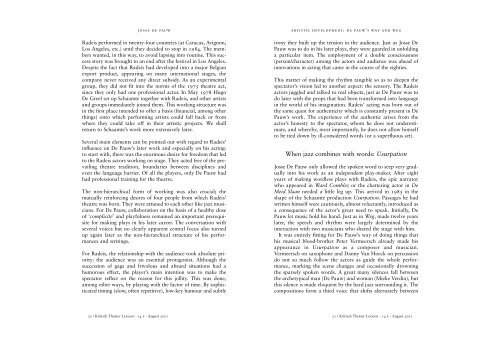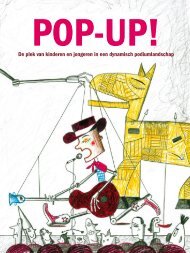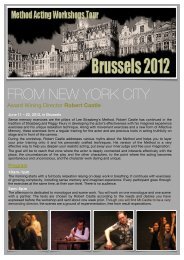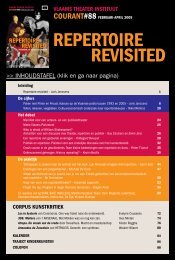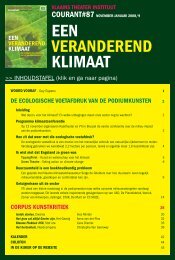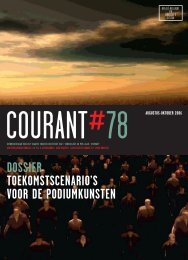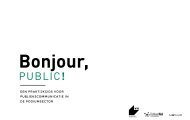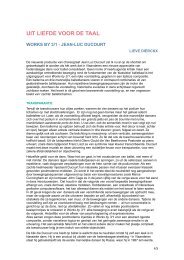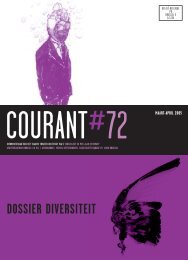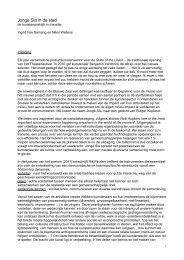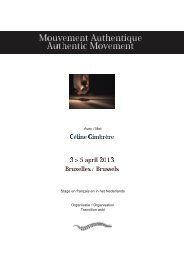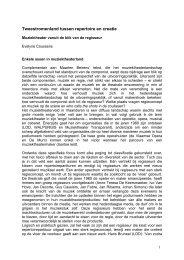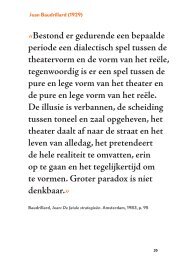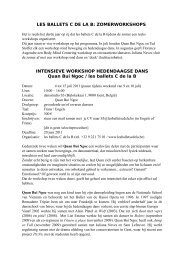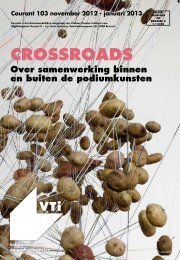Create successful ePaper yourself
Turn your PDF publications into a flip-book with our unique Google optimized e-Paper software.
josse de pauw<br />
Radeis performed in twenty-four countries (at Caracas, Avignon,<br />
Los Angeles, etc.) until they decided to stop in 1984. The members<br />
wanted, in this way, to avoid lapsing into routine. This success<br />
story was brought to an end after the festival in Los Angeles.<br />
<strong>De</strong>spite the fact that Radeis had developed into a major Belgian<br />
export product, appearing on many international stages, the<br />
company never received any direct subsidy. As an experimental<br />
group, they did not fit into the norms of the 1975 theatre act,<br />
since they only had one professional actor. In May 1978 Hugo<br />
<strong>De</strong> Greef set up Schaamte together with Radeis, and other artists<br />
and groups immediately joined them. This working structure was<br />
in the first place intended to offer a basis (financial, among other<br />
things) onto which performing artists could fall back or from<br />
where they could take off in their artistic projects. We shall<br />
return to Schaamte’s work more extensively later.<br />
Several main elements can be pointed out with regard to Radeis’<br />
influence on <strong>De</strong> <strong>Pauw</strong>’s later work and especially on his acting:<br />
to start with, there was the enormous desire for freedom that led<br />
to the Radeis actors working on stage. They acted free of the prevailing<br />
theatre tradition, boundaries between disciplines and<br />
even the language barrier. Of all the players, only <strong>De</strong> <strong>Pauw</strong> had<br />
had professional training for the theatre.<br />
The non-hierarchical form of working was also crucial; the<br />
mutually reinforcing desires of four people from which Radeis’<br />
theatre was born. They were attuned to each other like jazz musicians.<br />
For <strong>De</strong> <strong>Pauw</strong>, collaboration on the basis of a healthy dose<br />
of ‘complicité’ and playfulness remained an important prerequisite<br />
for making plays in his later career. The conversation with<br />
several voices but no clearly apparent central focus also turned<br />
up again later as the non-hierarchical structure of his performances<br />
and writings.<br />
For Radeis, the relationship with the audience took absolute priority:<br />
the audience was an essential protagonist. Although the<br />
succession of gags and frivolous and absurd situations had a<br />
humorous effect, the player’s main intention was to make the<br />
spectator reflect on the reason for this jollity. This was done,<br />
among other ways, by playing with the factor of time. By sophisticated<br />
timing (slow, often repetitive), low-key humour and subtle<br />
20 / Kritisch Theater Lexicon - 14 e - August 2001<br />
artistic development: de pauw’s way and weg<br />
irony they built up the tension in the audience. Just as Josse <strong>De</strong><br />
<strong>Pauw</strong> was to do in his later plays, they were guarded in unfolding<br />
a particular item. The employment of a double consciousness<br />
(person/character) among the actors and audience was ahead of<br />
innovations in acting that came in the course of the eighties.<br />
This matter of making the rhythm tangible so as to deepen the<br />
spectator’s vision led to another aspect: the sensory. The Radeis<br />
actors juggled and talked to real objects, just as <strong>De</strong> <strong>Pauw</strong> was to<br />
do later with the props that had been transformed into language<br />
in the world of his imagination. Radeis’ acting was born out of<br />
the same quest for authenticity which is constantly present in <strong>De</strong><br />
<strong>Pauw</strong>’s work. The experience of the authentic arises from the<br />
actor’s honesty to the spectator, whom he does not underestimate,<br />
and whereby, most importantly, he does not allow himself<br />
to be tied down by ill-considered words (or a superfluous set).<br />
When jazz combines with words: Usurpation<br />
Josse <strong>De</strong> <strong>Pauw</strong> only allowed the spoken word to seep very gradually<br />
into his work as an independent play-maker. After eight<br />
years of making wordless plays with Radeis, the epic narrator<br />
who appeared in Ward Comblez or the chattering actor in <strong>De</strong><br />
Meid Slaan needed a little leg up. This arrived in 1985 in the<br />
shape of the Schaamte production Usurpation. Passages he had<br />
written himself were cautiously, almost reluctantly, introduced as<br />
a consequence of the actor’s great need to speak. Initially, <strong>De</strong><br />
<strong>Pauw</strong> let music hold his hand. Just as in Weg, made twelve years<br />
later, the speech and rhythm were largely determined by the<br />
interaction with two musicians who shared the stage with him.<br />
It was entirely fitting for <strong>De</strong> <strong>Pauw</strong>’s way of doing things that<br />
his musical blood-brother Peter Vermeersch already made his<br />
appearance in Usurpation as a composer and musician.<br />
Vermeersch on saxophone and Danny Van Hoeck on percussion<br />
do not so much follow the actors as guide the whole performance,<br />
marking the scene changes and occasionally drowning<br />
the sparsely spoken words. A great many silences fall between<br />
the arc<strong>het</strong>ypical man (<strong>De</strong> <strong>Pauw</strong>) and woman (Mieke Verdin), but<br />
this silence is made eloquent by the hard jazz surrounding it. The<br />
compositions form a third voice that shifts alternately between<br />
21 / Kritisch Theater Lexicon - 14 e - August 2001


